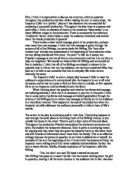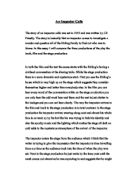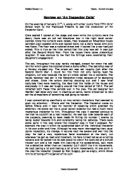An inspector calls
An inspector calls, an interesting and not to mention notorious play with twists and turn running throughout the plot. Things suddenly swapping from the happiest parts of the play straight to the nadir of the story, it evolves and begins with when everything is going so well, an ‘inspector calls’. As you should know this play is categorised as a tragedy, and rightly so; a tragedy is define as ‘a type of drama in which characters undergo suffering or calamity’. There are other aspects however, we saw this performance acted live in front of us, so as well as the obvious, ‘how good is the story?’ there are things to consider like direction and acting abilities. The Birling family and good old inspector never ceased to entertain me in this evidently well sought out performance. Now for a bit of background to the play, this information I have collected from many different sources, for example the programme and information from the production company’s website. Starting with the genius behind the plot, one J. B. Priestley an English playwright, who wrote the play before it was premiered in Moscow, Russia. Then, being the big hit it was, found its way to the west end playing at London’s New Theatre in 1946. Some would straight away name it a drama, others a tragedy, others say it could be classed as a parable with a moral (which is understandably for points I will cover shortly).
The production we saw was at Nottinghams own Theatre Royal, I would like to outline the plot and introduce the characters involved, both the character and the actors who play them. First is the Birling family. Played by David Roper there’s the head of the family and father of two Arthur, let’s not mention how he a considerable amount of times echoes his jobs as a magistrate and a mayor (or at least previous jobs), this man possesses shear arrogance and a callous personality. Sandra Duncan plays Sybil and perfectly if I must say so, she really captures the snobbiness she would posses. We as an audience should bear in mind that at this time, similar to now, everybody was almost designated a social class, the Birling family with there large riches (which they don’t half brag about constantly) puts them nicely into upper-class with them living fancy lives comfortably. The pair of them, it occurred to me seem very selfish, they just want to be left alone with no concern of what the inspector has to say wanting to protect his family and continue with the “rudely interupted” party they were having. Some could descirbe him as a positive thinking person, I noted him saying at the beginning of the play that there isn’t going to be a war, but we as the audience know (the setting of this play being very early 1900’s) that there is going to be a war, thus getting us thinking what else he may be wrong about. And then back to his wife, she seems to speak down to everyone, even during a normal conversation when telling the inspector about this Eva Smith girl she describes her as “a girl of that class”.






